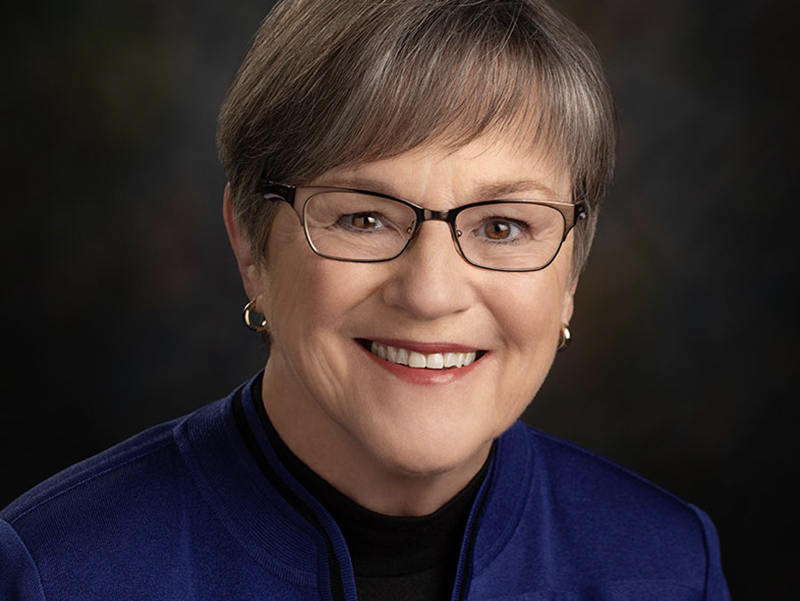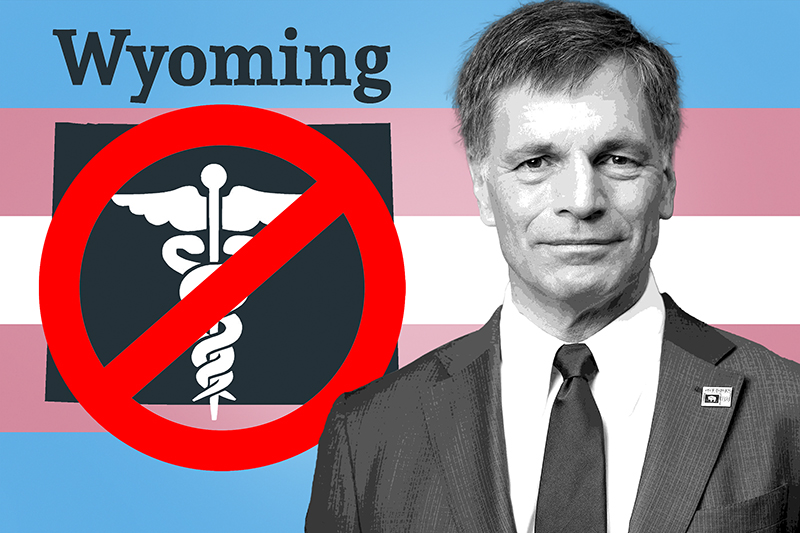Arkansas lawmakers pass bill criminalizing gender-affirming health care for trans youth
Advocates say bill is an effort to "eradicate" the transgender community by making it nearly impossible to transition.
By John Riley on March 30, 2021 @JRileyMW

On Monday, the Arkansas Senate passed a bill that would criminalize doctors who prescribe gender-affirming health care treatments to transgender minors.
Under the so-called “Arkansas Save Adolescents From Experimentation Act,” doctors would be threatened with disciplinary action or the loss of their license if they recommend puberty blockers, hormones, or surgery to transgender-identifying youth.
The bill would allow minors who were prescribed treatments for gender dysphoria to sue physicians for up to 20 years afterwards — which, along with the aforementioned threats of loss of licensure or disciplinary action, will effectively force doctors to refuse to treat transgender youth to protect themselves from liability.
The bill also prohibits public funds, including Medicare and Medicaid, from being used to cover the costs of transition-related care, prevents private insurance from covering treatments for gender dysphoria for patients under the age of 18, and allows health care plans to refuse to cover transition-related treatments or procedures.
Gov. Asa Hutchinson is expected to sign the bill, given his previous endorsement of at least two other bills targeting the LGBTQ community for discrimination. Should he do so, Arkansas will become the first state to ban gender-affirming care for transgender youth.
Similar bills are currently being considered in Alabama, where the Senate passed a law making prescribing gender-affirming treatments to minors a felony; and Tennessee, where a House committee has approved a bill under which doctors would be charged with misdemeanors for recommending such treatments.
Speaking during a press conference on Monday, Chase Strangio, the deputy director for transgender justice at the American Civil Liberties Union, called the Arkansas bill “the single most extreme anti-trans law to ever pass through a state legislature.”
“This bill puts physicians in a position of having to either meet their ethical obligations as physicians to their patients, or to violate state law, which could compromise their medical license altogether,” Strangio said. “When we look at the impulse behind these bills, one of them is to stop people from being trans and to eradicate trans-ness — which is never going to happen.
“The other motivation we’re seeing in the context of anti-abortion laws and restrictions on access to reproductive health care, is a desire on the part of the government to restrict bodily autonomy and control people’s bodies.”
Rumba Yambú, director of the Arkansas-based transgender advocacy organization inTRANSitive, said it was “painful” to see lawmakers targeting transgender individuals, specifically youth with various bills seeking to erode their rights and challenge their humanity.
“Every trans Arkansan I know is hurting because of these bills,” Yambú said. “We need our trans siblings and our trans allies outside of Arkansas to help shine a light here. We need you all to help us elevate our voice, and put pressure on Governor Asa Hutchinson” in hopes he will veto the measure.
See also: Missouri father’s testimony against trans athlete ban gains national attention
“We want every trans kid in Arkansas and every trans adult to know that we’re working and strategizing around the clock to fight these bills. We’ve been here before this legislative session, and we will be here for you after,” Yambú added. “To every trans kid, know that it is a fact that you were born blessed. Being trans is a blessing and it’s a blessing that scares people who were born without it, because we break every binary they’ve constructed in order to hold on to power.”
Opponents of the bill alleged that the bill, and others like it, are being pushed by out-of-state organizations, including anti-LGBTQ groups like the Family Research Council and Alliance Defending Freedom.
“These bills are not constituent-driven pieces of legislation,” Strangio said, referring to the efforts by outside groups as an attempt to “eradicate trans lives.”
“These bills are not drafted in Arkansas. They were not originated in Arkansas,” he added. “And ultimately, we have to bring all of the resources to bear, to fight what is an incredibly well-funded global movement to attack us.”
Opponents have also balked at the idea that lawmakers — most of whom don’t possess degrees or specialized training — would intervene into private and family medical decisions. Several parents of transgender youth have expressed disgust at lawmakers’ assumptions that they are making an impulsive decision without sufficient information when they decide to allow their children to transition.

Joanna Brandt, the mother of a 15-year-old trans son, said she had to make “tough decisions” in her child’s best interests over the years, noting that she had carefully weighed and considered all options before deciding to allow her son to receive gender-affirming medical care, in consultation with his personal physician.
“I didn’t make that choice lightly…. I sought the advice and expertise of medical professionals,” Brandt said. “The idea of consulting lawmakers never occurred to me because they should not have a part in these decisions. I did my research. I educated myself on our options and thought long and hard on what I felt was in his best interest.
“Today, after two years of therapy, doctor’s visits and almost 18 months of gender-affirming hormone therapy, Dylan is happy, healthy, confident and hopeful for his future,” she said. “My son will be devastated if he is forced to stop his hormone treatment. All of the progress that he has made, all the plans to be able to graduate from high school and go off to college, presenting outwardly in the full expression of how he feels on the inside, would come to a screeching halt.”
Transgender actress Laverne Cox said it was “exhausting” for transgender people and youth to be dealing with attacks against them in addition to the problems they face due to discrimination or lack of resources.
Cox said the Arkansas bill — as well as a similar one in her home state of Alabama — have to be viewed as a continuation of ongoing attempts to stigmatize or marginalize transgender people, beginning with the spate of “bathroom bills” introduced in various legislatures just a few years ago.
“It seems so insane, but what I see in the media are efforts to dehumanize and stigmatize trans folk, to objectify reduce us to our bodies and medical procedures. And I have to say, I’ve been reticent to speak out about this, honestly, because I’m tired and I don’t want to have conversations with and about trans people that dehumanize us,” Cox said. “I’ve met so many young people who’ve said that access to health care has saved their lives. And when we deny that access to health care to trans youth, we know that there are higher rates of suicide, higher rates of depression.
“Trans is beautiful. The humanity of trans people is beautiful and should be celebrated,” she added. “The conversations I’ve seen happening around young trans young people are just deplorable. Can we just remember that these are human beings, that they are people and that any decisions about the health care of trans youth should be made between that transgender young person, their parent and their doctor? The government has no place in these decisions.”
See also: Alabama cop, father of trans woman, begs lawmakers not to outlaw health care for trans youth
LGBTQ advocates have also noted that most reputable medical and mental health associations oppose efforts to block transgender youth from accessing transition-related care, including the American Medical Association, the American Academy of Child & Adolescent Psychiatry, the American Academy of Pediatrics, the World Professional Association of Transgender Health, and the Endocrine Society. They also contest the idea, promulgated by conservative lawmakers, that transition-related care, which has been around for decades is somehow “experimental” or harmful to children.
The Trevor Project, the world’s largest suicide prevention and crisis intervention organization for LGBTQ youth, expressed well-founded fears that the Arkansas bill would simply increase the rates of suicide, suicidal ideation, or self-harm among trans youth. The organization has supported over 850 crisis contacts — in other words, youth who reached out because of feelings of depression, despondency, or suicidal ideation — in Arkansas over the past year, and believes that number will increase if trans youth are barred from transitioning.
“The evidence is clear: gender-affirming care produces positive mental health outcomes and reduces suicide risk. That’s why it’s considered best-practice, embraced by doctors across the country, and endorsed by every major medical association,” Sam Brinton, the vice president of advocacy and government affairs for The Trevor Project, said in a statement. “Governor Hutchinson should listen to the experts — and transgender young people in Arkansas — and veto this cruel bill. It’s a matter of life and death.”
Read more:
Tennessee bill would allow students to opt out of learning LGBTQ content
Megan Rapinoe refutes argument that anti-trans sports bills somehow “protect” women
Kansas Governor Vetoes Trans Health Care Ban
Kansas Governor Laura Kelly vetoed a bill banning gender-affirming treatments for minors, all but daring Republicans to override it.
By John Riley on April 16, 2024 @JRileyMW
Kansas Democratic Gov. Laura Kelly vetoed a bill seeking to block the ability of transgender youth to access gender-affirming treatments.
The bill, passed largely along party lines by both chambers of the Republican-led Legislature, prohibits any entity receiving state funds from providing or subsidizing gender-affirming treatments for minors.
It also prohibits individuals or entities receiving state funds, or state employees in their official capacity, from encouraging youth who are suffering from gender dysphoria to pursue either medical or social transition.
53 LGBTQ Candidates Were on The Ballot Tuesday. Here’s How They Fared.
Several LGBTQ candidates either won outright or earned berths in runoff elections following the "Super Tuesday" primaries.
By John Riley on March 6, 2024 @JRileyMW
Several LGBTQ candidates were successful in yesterday's "Super Tuesday" primaries, with some winning their party's nomination and others moving on to runoff elections.
Candidates appeared on the ballot in six different states: Texas, California, Arkansas, Tennessee, Vermont, and North Carolina, with several candidates poised to become historic "firsts" should they emerge victorious in general elections later this year.
In Texas, Molly Cook, running in the Houston-based 15th State Senate District, placed second, with 21% of the vote.
Because none of the Democratic candidates in the primary reached the 50% plus one vote threshold needed to win the primary, Cook will face off against State Rep. Jarvis Johnson in a runoff election on May 28.
Wyoming Bans Health Care for Trans Youth
Doctors and health professionals in Wyoming will now be prevented from prescribing gender-affirming treatments to transgender youth.
By John Riley on April 1, 2024 @JRileyMW
The state of Wyoming has barred transgender minors from accessing gender-affirming treatments to help them socially and medically transition.
The bill, passed by the overwhelmingly Republican legislature and signed into effect by GOP Gov. Mark Gordon, penalizes any healthcare professionals who prescribe puberty blockers, hormone therapy, or surgical interventions to minors.
Doctors, pharmacists, and other healthcare providers who defy the law can have their licenses suspended or revoked.
Unlike some other Republican-led states, the bill does not have a "grandfather clause" that allows children to continue receiving treatment if they have already begun.
Support Metro Weekly’s Journalism
These are challenging times for news organizations. And yet it’s crucial we stay active and provide vital resources and information to both our local readers and the world. So won’t you please take a moment and consider supporting Metro Weekly with a membership? For as little as $5 a month, you can help ensure Metro Weekly magazine and MetroWeekly.com remain free, viable resources as we provide the best, most diverse, culturally-resonant LGBTQ coverage in both the D.C. region and around the world. Memberships come with exclusive perks and discounts, your own personal digital delivery of each week’s magazine (and an archive), access to our Member's Lounge when it launches this fall, and exclusive members-only items like Metro Weekly Membership Mugs and Tote Bags! Check out all our membership levels here and please join us today!
The Magazine
-
Most Popular
 Aaron Rodgers Suggests AIDS Was Created by U.S. Government
Aaron Rodgers Suggests AIDS Was Created by U.S. Government  School Board Cancels '30 Rock' Star's Anti-Bullying Talk
School Board Cancels '30 Rock' Star's Anti-Bullying Talk  Turning 'The Outsiders' Into a Musical Was a Mistake (Review)
Turning 'The Outsiders' Into a Musical Was a Mistake (Review)  Grindr's New Feature "Roam" Connects Users Around the Globe
Grindr's New Feature "Roam" Connects Users Around the Globe  LGBTQ Websites Could Be Sued Under Kansas Anti-Porn Law
LGBTQ Websites Could Be Sued Under Kansas Anti-Porn Law  Star Trek Discovery's Wilson Cruz Keeps Making Television History
Star Trek Discovery's Wilson Cruz Keeps Making Television History  DC Black Pride 2024: Everything You Need to Know
DC Black Pride 2024: Everything You Need to Know  Mississippi Man Accused of Slaughtering Ex-Boyfriend
Mississippi Man Accused of Slaughtering Ex-Boyfriend  How Vending Machines Can Save Lives in Substance Abuse Crisis
How Vending Machines Can Save Lives in Substance Abuse Crisis  Conservative Ad Makes Case for Transgender Rights
Conservative Ad Makes Case for Transgender Rights
 School Board Cancels '30 Rock' Star's Anti-Bullying Talk
School Board Cancels '30 Rock' Star's Anti-Bullying Talk  Aaron Rodgers Suggests AIDS Was Created by U.S. Government
Aaron Rodgers Suggests AIDS Was Created by U.S. Government  LGBTQ Websites Could Be Sued Under Kansas Anti-Porn Law
LGBTQ Websites Could Be Sued Under Kansas Anti-Porn Law  HRC's Kelley Robinson Makes the Time 100 List
HRC's Kelley Robinson Makes the Time 100 List  Grindr's New Feature "Roam" Connects Users Around the Globe
Grindr's New Feature "Roam" Connects Users Around the Globe  Kansas Governor Vetoes Trans Health Care Ban
Kansas Governor Vetoes Trans Health Care Ban  Court Blocks West Virginia Trans Athlete Ban
Court Blocks West Virginia Trans Athlete Ban  DC Black Pride 2024: Everything You Need to Know
DC Black Pride 2024: Everything You Need to Know  Conservative Ad Makes Case for Transgender Rights
Conservative Ad Makes Case for Transgender Rights  How Vending Machines Can Save Lives in Substance Abuse Crisis
How Vending Machines Can Save Lives in Substance Abuse Crisis
Scene
Metro Weekly
Washington's LGBTQ Magazine
P.O. Box 11559
Washington, DC 20008 (202) 638-6830
About Us pageFollow Us:
· Facebook
· Twitter
· Flipboard
· YouTube
· Instagram
· RSS News | RSS SceneArchives
- "We use cookies and other data collection technologies to provide the best experience for our customers. You may request that your data not be shared with third parties here: "Do Not Sell My Data
Copyright ©2024 Jansi LLC.










